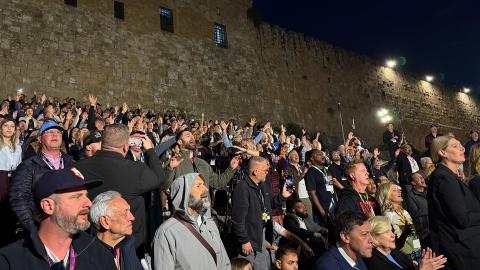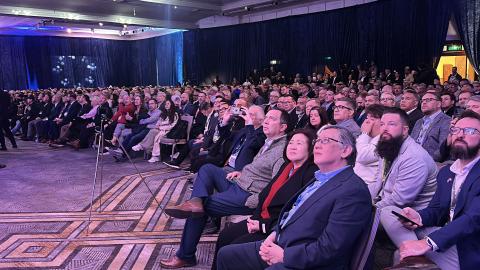Agriculture Experts Warn of Threat to Israel's Food Supply from Terror Onslaught, Worker Shortage
TEL AVIV, Israel – In Israel's ongoing fight across multiple fronts, a new concern is emerging after almost a year. As farmers leave their fields to answer the call to arms, the food supply could become a threat to Israel's survival.
Since the October 7th attack, almost 90 percent of Israel's farmers have reported significant damage to their land, equipment, and livestock. As for servicing the fields, most foreign workers have fled, and many farmers are serving as reservists, with others included in the 80,000 evacuated from the growing hostility in the north.
Dr. Liron Amdur, an Israeli agricultural and food systems researcher, told CBN News, "The agriculture in Israel is in danger because most of the fields are on the borders."
This threat resulted in a rapidly convened conference on Israel's food security that included agriculture experts such as Dr. Amdur and Yoel Zilberman of Hoshomer Hachadash, an organization focused on preserving the land and helping farmers.
Zilberman, who co-founded Hashomer Hachadash, told us the war has highlighted the vulnerability of the food supply because so much is imported.
"We know that there is one port that got closed because of the Houthis nearby, like in the Red Sea (near) Eilat, and the danger on our ports is, the risk – is very very high – in Haifa and Ashdod.
Zilberman also included declining food production as a critical threat.
"Today we are dependent on Ukraine, today we are dependent on Turkey, today we are dependent on Jordan. It's unbelievable," he stated.
Amdur revealed that on the Global Food Security Index (GFSI) Israel received a zero in "commitment to food security policy and food accessibility."
She explained, "About 80% of our calories come from imported food, especially cereals, which is the basic for what we eat, but also what livestock..so if we don't have cereals then we don't have milk. We don't have meat, we don't have eggs, ok? And we hardly produce any in Israel. We produce less than 10% of what we consume."
Zilberman noted, "The agricultural industry has lost 10,000 farmers in the last 20 years."
He blames that on the collapse of agricultural collectives known as kibbutzim, combined with the nation's focus on technology and startups.
Amdur hopes that given these exposed threats, Israel might see this as a turning point leading to transformation.
"First of all, food security became an issue," she said. "The Ministry of Agriculture and Rural Development – I think about a month ago – they changed their name to the Ministry of Agriculture and Food Security because there was no government agency to deal with food security in Israel.
Amdur has worked with members of Hashomer Hachadash on a strategy to regenerate agriculture by building on the organization’s achievements over the last 17 years.
We actually built the biggest volunteer organization in Israel, Zilberman told us. "Today we have more than a quarter of a million volunteers that came to help the farmers. We built like a one-stop shop for farming in Israel."
Dr. Amdur pointed out that the young are also involved. "They have schoolchildren, ok? Boarding schools for children that work in the morning for 4 hours on farms, on actual farm commercial farms, and then they go and study and finish their high school diploma," she said.
Zilberman added to that, noting,"The idea (is) that young people will be the future farmers of Israel, including with the youth movement, with more than 20,000 kids from all around Israel, including Bedouin kids that wanted to join the movement; they said they want to be part of the story, part of the story of Israel,"
Daniel Chisin has spent his final school year with Hashomer before enlisting with the Israel Defense Forces.
He told CBN News, "After the army I would love to be part of farmwork, working on the land. I feel that there's a deeper meaning, an existential meaning, It's tied to our identity and who were are as Israelis."
In looking further into the future, Zilberman moved the focus to technology as a key in sustaining the country.
He asserted, "Bringing in technology and bringing in you know all the innovations of AI. and I think in many many ways this will build the future in Israel, and also we understand that we need to do a very, very fast move to make sure that Israel will be food independent.
***Please sign up for CBN Newsletters and download the CBN News app to ensure you keep receiving the latest news from a distinctly Christian perspective.***




